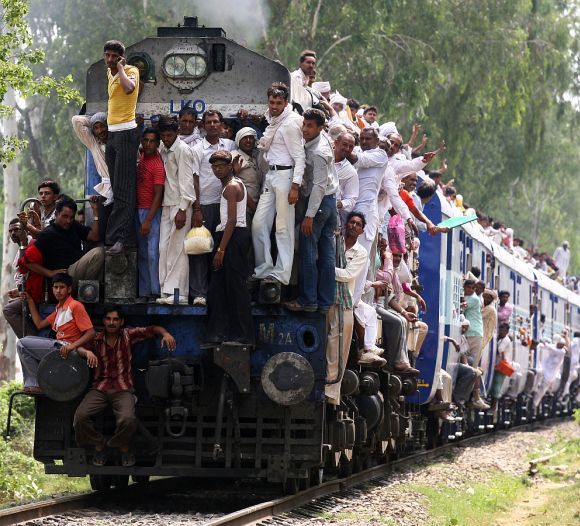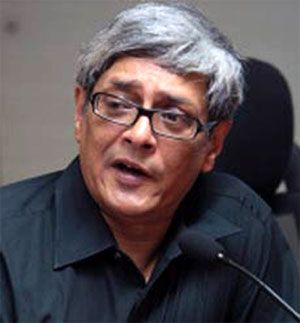
'IR must cleanly separate its commercial work from social objective'
'If I am going to set up a rail track in the north-east, money will be required to come from the finance ministry.'
'If an eastern zone Rajdhani goes to Delhi, it will not be cleaned properly. There is tension between the zones all the time.'
Days before Bibek Debroy (photographed below) gave a report of his committee on railway restructuring, he was travelling by a Rajdhani which was re-routed.
The troubled member of the National Institute for Transforming India Aayog constantly kept tweeting his angst.
“Consequences of derailment & rerouting. Pantry car has no provisions. Power car running out of diesel.”
The report had gone to print by then but it gave Debroy a first-hand experience of a low-end passenger train on a premium train itself.
In an interview with Business Standard, he blames the unhealthy competition among railway zones for poor service quality and inefficiencies.
Excerpts:
Your committee’s report has recommended separation of power among different entities and empowering of zones. How will it improve the railway functioning?
Our report envisages three entities -- the ministry of railways, the railway board and the regulator.
The ministry formulates policy for the sector and not only for Indian Railways. It decides what is in the interest of the country and railway.
We are also talking about functioning of different zones as almost independent revenue centres.
People who have not read the report tend to think that we expect every zone to make a profit.
We don’t expect that. Every zone should have an independent account.
Imagine a train going from Delhi to Howrah does not belong to IR but to a zone.
All rolling stock is owned by some zone.
If it is a Rajdhani, it belongs to a zone.
When it is going, it needs to negotiate and obtain access to track across other zones and sometimes it does not get access. Every zone gives preference to its own train for track.
Problems of access to track are not something specific to the private sector. Public zones also have issues with access to track.
The ministry sets the rules for competition in terms of not only the private sector but also zones in the public sector.
Currently, for instance, if a north central Rajdhani goes to northern zone territory after being re-routed, it will go with a goods train.
Another example is if a Rajdhani is owned by the northern or the eastern zone, it might go for cleaning to a yard in Delhi or Howrah.
If an eastern zone Rajdhani goes to Delhi, it will not be cleaned properly.
There is tension between the zones all the time.
The railway unions have opposed forming a regulator which has more than tariff regulation powers. Why do you need such a regulator?
The most important task for the regulator is to ensure rules of competition, not only for access of tracks but also standards.
Setting of standards like the stuff done by the Research Designs and Standards Organisation can also be a deterrent to free competition.
IR must cleanly separate its commercial work from social objective and the government must cleanly pay the Railways for the social function.
Every year, the railway budget mechanically shows a figure for social obligation.
You show me how it is arrived at?
There is no scientific method to it. The regulator will do that computation.
Finally, the regulator will be in the business of tariffs (rates).
What role do you envisage for the Railway Board?
The Board will have nothing to do with potential private operators.
That will be the function of the ministry and the regulator. If a train is passing through a track, that zone has to be compensated.
If that figure is not derived at, except thinking of some number than even today, the Railway Board is not balancing the interest of different zones.
When a new train is introduced, the Board should arrive at an internal rate of return but am I not supposed to evaluate the disruption it will cost to existing things?
Am I not supposed to consult zones?
The Railway Board should do this.
There is an inter-zonal coordination committee.
Prove to me that the Railway Board does this, except purely whimsically. Even today, it is not doing its job.
Why have the Railway Board then?
You need somebody to oversee the functioning of IR.
There are production units, locomotives have to be apportioned out to different zones, wagons and coaches.
You can call it a board or a governing council.
Who gets to decide the annual plan, currently a function of the Board?
Part of it is decided at the board level and partly at zonal level.
Today, there is too much centralisation.
A general manager of a zone is not asked what kind of coach he wants. Why should he be not empowered to deal with Rae Bareli and tell them this is what is needed?
There is capital expenditure of different types. If you are talking about creating fresh track, broad gauge and safety, that’s one level. What kind of locomotives and coaches should a zone get. . .that is another level. Suppose there is a track is completely within a zone.
Why should I not have the right to decide on that track what safety or broad gauge?
If in addition, I will meet it out of my revenue, give me the right on spending Rs 50 or at least Rs 25, out of every Rs 150 that I earn, for relevant expenditure.
There will be issues and internal zonal trade-offs.
Do you think the railway regulator should have powers for macro planning, where inter-zonal issues are involved, just like the Central Electricity Regulatory Commission, which gets involved in transmission and tariff issues when it involves more than one state?
Not entirely.
This power stays with the Railway Board. Investment will have nothing do with regulator.
At the same time, if I am going to set up a rail track in the north-east, money will be required to come from the finance ministry.
How can the Railway Board go and get that money?
It will be the minister who has to go and get the money.
If it is the Indian Railways’ money, do whatever you want to do with it.
For non-IR money, how can the Board go and access that money? That’s the reason you have the railway minister; otherwise you can call the board chairman the minister.
 The unions have said the committee has a drastically confused perspective of the European railways and that it wants the failed British model to be adopted...
The unions have said the committee has a drastically confused perspective of the European railways and that it wants the failed British model to be adopted...
There is no reference to any model in the text of the final report.
There is some data because for every good thing, I will be able to give experience from somewhere in the world and for every stupid thing, I can give example from elsewhere.
They are talking about something specific without reading the report.
There is unbundling of the track and operating of trains.
In the British model, that was privatised before it was reversed.
In the interim report, we never said it should be privatised. We said bifurcate.
The British model was about privatisation and reversal of it.
We want it because there is conflict of interest. In a vertically integrated structure like the Indian Railways, unbundling causes huge headache.
You don’t do it unless you have to.
We have divided it into initial five years and then five years.
In the initial five years, let the regulator come in so that he can resolve issues. If he cannot, then there are recommendations for the next five years.
Aren't your recommendations bold and politically difficult to adopt?
Not bold at all.
One way of looking at it is to say go back to 1950. That’s all we are saying.
Whether it is de-centralisation, or accounting standards, the Railways were much cleaner in 1940.
The regulator was there before 1924.
It is nothing new. Over a period of time, the Railway Board has spread its tentacles everywhere.
We are just reversing everything.
Image: People travel in an overcrowded passenger train. Photograph: Ajay Verma/Reuters









